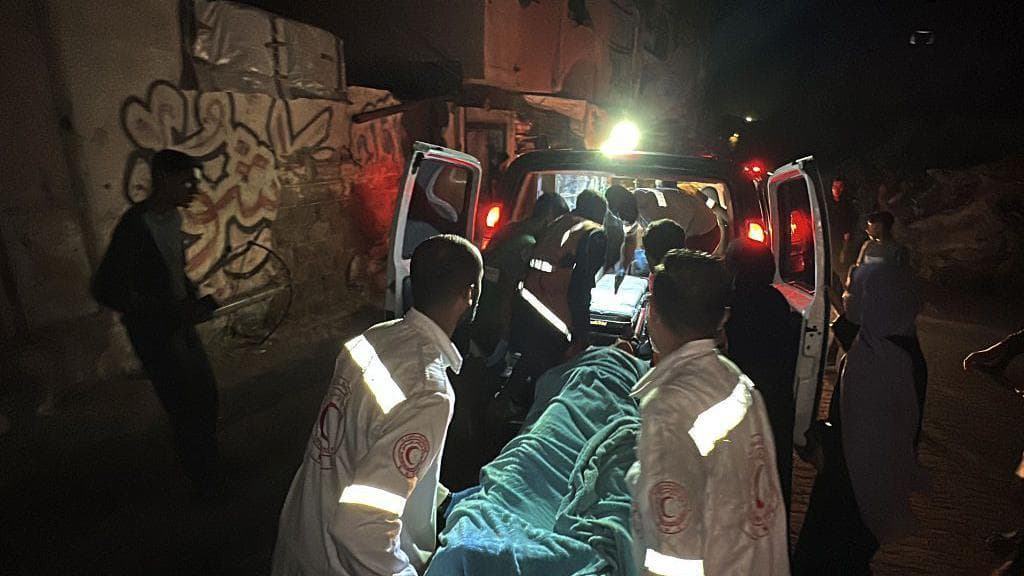We're loading the full news article for you. This includes the article content, images, author information, and related articles.
A fragile, US-brokered ceasefire shattered Tuesday after Israel launched retaliatory airstrikes across Gaza, killing at least 33 Palestinians, following accusations of truce violations by Hamas.

A US-brokered ceasefire in Gaza collapsed on Tuesday, October 28, 2025, after the Israeli military launched a wave of airstrikes across the territory, killing at least 33 people and wounding dozens, according to Gaza's Hamas-run Civil Defence agency. The strikes followed accusations by Israel that Hamas had violated the truce by attacking its soldiers and failing to properly return the remains of a deceased hostage.
The bombardment targeted multiple locations, including Gaza City, Khan Younis, al-Bureij, Nuseirat, and Beit Lahia, hitting homes and residential buildings. Mahmud Basal, a spokesman for the Civil Defence, told Agence France-Presse (AFP) that rescue crews were overwhelmed. "Our crews are still working to recover the dead and wounded from under the rubble," he stated on Tuesday evening, EAT. Medical sources reported casualties included children.
The escalation marks the most significant threat to the ceasefire that officially began on October 10, 2025, a deal negotiated by the United States, Egypt, Qatar, and Turkey to end over two years of devastating conflict.
The violence erupted hours after Israeli officials reported that their troops were attacked in southern Gaza's Rafah area with an anti-tank missile and gunfire. Israeli Defence Minister Israel Katz declared the attack a "crossing of a glaring red line," vowing that Hamas would pay a "heavy price." In a statement on Tuesday evening, Prime Minister Benjamin Netanyahu's office confirmed he had ordered "immediate and powerful strikes in Gaza."
Israel also accused Hamas of violating the agreement concerning the return of hostages' remains. Officials stated that Hamas had returned partial remains of Ofir Tzarfati, a hostage whose body had already been largely recovered by Israeli forces in late 2023. There are still 13 bodies of hostages believed to be held in Gaza.
Hamas, in a statement, denied any connection to the attack on Israeli soldiers in Rafah and affirmed its commitment to the ceasefire. The group condemned the Israeli strikes as a "criminal assault" and a "serious violation of the ceasefire agreement." Hamas further accused Israel of repeatedly breaching the truce, stating that Israeli fire had killed 94 Palestinians since the agreement began. The militant group also said it would delay a planned handover of another hostage's remains in response to the bombardment.
Speaking to reporters aboard Air Force One on Wednesday, October 29, US President Donald Trump stated that "nothing" would jeopardize the ceasefire but affirmed Israel's right to retaliate. "They killed an Israeli soldier. So the Israelis hit back. And they should hit back," Trump said. US officials confirmed that Israel had notified them before launching the strikes.
The renewed violence puts a halt to a period of relative calm that had allowed humanitarian aid into the besieged strip. According to the United Nations Office for the Coordination of Humanitarian Affairs (OCHA), the conflict, which began on October 7, 2023, has resulted in the deaths of over 68,500 Palestinians. The humanitarian situation remains dire, with widespread destruction and displacement.
For Kenya and the East Africa region, the collapse of the ceasefire raises concerns about broader regional instability. Earlier in October, Kenya's government, through Prime Cabinet Secretary Musalia Mudavadi, had welcomed the ceasefire as a "vital step in easing human suffering in Gaza" and reiterated its support for a two-state solution. President William Ruto had previously, at the UN General Assembly in September 2024, called for a permanent ceasefire and adherence to international law. While direct economic impacts on Kenya are not immediate, prolonged conflict in the Middle East has historically carried the potential to affect global fuel prices and shipping routes, which could have knock-on effects for the Kenyan economy. The situation remains under close international observation as mediators work to prevent a full-scale resumption of the war.
Keep the conversation in one place—threads here stay linked to the story and in the forums.
Sign in to start a discussion
Start a conversation about this story and keep it linked here.
Other hot threads
E-sports and Gaming Community in Kenya
Active 9 months ago
The Role of Technology in Modern Agriculture (AgriTech)
Active 9 months ago
Popular Recreational Activities Across Counties
Active 9 months ago
Investing in Youth Sports Development Programs
Active 9 months ago